ISL for Experienced Clinical Personnel and Teams
Ultimately the most important users of immersive and simulation-based training will be experienced clinical personnel and teams. Programs for these groups can be conducted as either single-discipline activities (e.g. a curriculum just for experienced anesthesiologists, or one just for ICU nurses) or as true combined-team sessions (e.g. for doctors, nurses, respiratory therapists, pharmacists, etc. from the ICU). Each approach has advantages and disadvantages and they complement each other well.
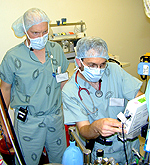
Many programs offer training based on principles adapted from Crew Resource Management in aviation, which focuses on the generic behavioral issues of managing challenging clinical situations (decision making and teamwork) through the presentation of clinically and interpersonally challenging simulated cases. Video-based debriefing following simulation scenarios allows detailed analysis of the strengths and weaknesses of the performance of the team during the simulation scenario.
Programs that are currently offered for experienced personnel include:
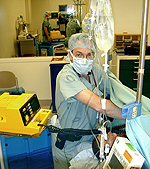
CRM Instructor Training (multiple disciplines): A three-day instructor course for teams wishing to learn to conduct CRM-oriented training in healthcare. Depending on the makeup of the nascent instructors, experts on simulation from relevant disciplines teach this course. (Multiple centers)
Maintenance of Certification in Anesthesia (MOCA®): A full-day simulation course for practicing anesthesiologists that fulfills one requirement of Part IV of the ABA requirements for maintenance of certification. (Stanford ILC)
Improving the Management of Patient Emergency Situations (IMPES): The half-day ICU CRM course combines physicians in various medical domains (ICU, internal medicine, surgery, anesthesia) with experienced nurses, respiratory therapists, and pharmacists. (VA Simulation Center)
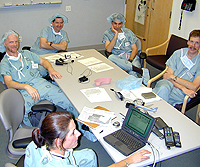
NeoSim: The full-day NeoSim course trains healthcare personnel in CRM principles applied to the resuscitation of the newborn. This course is offered either as a single-discipline course or as a combined-team course including pediatricians, neonatologists, neonatal nurses, delivery room nurses, neonatal nurse practitioners, respiratory therapists and all others who may be called upon to resuscitate the newborn. (CAPE)
Neonatal Transport Simulation: This full-day course prepares physicians, nurses and allied healthcare personnel for the responsibility of caring for newborns transported between facilities. (CAPE)
SimDR: This simulation course (full-day) expands neonatal resuscitation and delivery room training to the entire team caring for both the mother and the baby, including anesthesiologists, obstetricians, pediatricians, neonatologists, neonatal nurses, delivery room nurses, neonatal nurse practitioners, respiratory therapists. (CAPE)
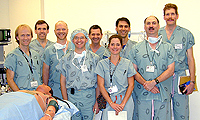
ECMO Sim: Prepares physicians, nurses, and allied healthcare personnel to effectively manage crises in Extracorporeal Membrane Oxygenation (ECMO) therapy. This is appropriate for neonatologists, neonatal nurse practitioners, neonatal nurses, pediatric intensivists, pediatric intensive care unit nurses, pediatric surgeons, perfusionists, respiratory therapists. (CAPE)
Comprehensive Training for L&D Personnel: This two-day course trains healthcare personnel in maternal advanced cardiac life support (ACLS), neonatal resuscitation (NRP), and electronic fetal monitor (EFM) interpretation and is targeted to labor and delivery room nurses, obstetricians, anesthesiologists, nurse practitioners, respiratory therapists, EMTs, fire & rescue personnel. (CAPE)
FetalSIM: Teaches healthcare personnel to effectively monitor fetal heart tracings during labor (full-day course). (CAPE)
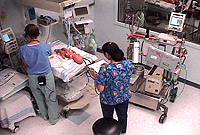
Perinatal Counseling Simulation: Prepares healthcare personnel to counsel parents regarding the developmental and physical outcomes of complications during pregnancy, labor and delivery. This course is appropriate for pediatricians, neonatologists, obstetricians, neonatal nurses, labor and delivery nurses, nurse practitioners, genetic counselors, social workers, chaplains. (CAPE)
Pediatric Advanced Life Support Simulation (PediSim): Trains healthcare personnel in resuscitation of the pediatric patient, specifically for pediatric intensivists, pediatric intensive care unit nurses, pediatric surgeons, anesthesiologists, respiratory therapists. (CAPE)

